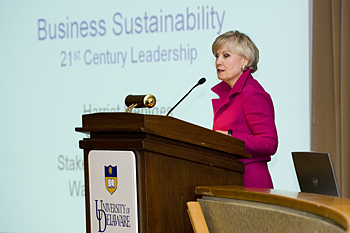
Hentges' lecture, “Can Wal-Mart be a Leader in Sustainability?”, part of the Department of Fashion and Apparel Studies' “Fashioning Social Responsibility” lecture series, focused on what Wal-Mart is doing to become a leader in sustainability. Hentges spoke about Wal-Mart's three main goals--to be supplied 100 percent by renewable energy, to create zero waste and to sell products that sustain resources and the environment.
Hentges explained that Wal-Mart stores have become more environmentally conscious and are finding ways to cut costs while simultaneously doing less harm to the environment. She said that Wal-Mart has reduced packaging to the size of its products and increased the use of recycled materials. Because packaging is smaller, Wal-Mart trucks make fewer trips and use less fuel for transport, and smaller packages also result in less nonrecyclable material going into landfills, she said.
Wal-Mart also has extracted water from liquid products, such as detergent, to decrease package weight and size, and Wal-Mart puts fewer heavy metals into computers it sells and is using lights activated by sensors to conserve energy in its stores, Hentges said.
According to market research, Hentges said, 73 percent of consumers said they wouldn't go out of their way to purchase sustainable products, but 83 percent said they are interested in purchasing sustainable products.
“What we say often is that once you put the sustainability lens on, you can't take it off,” she said. “These are small steps for Wal-Mart and small steps for consumers, but collectively it has a big impact for all.”
Before working for Wal-Mart, Hentges was chief operating officer for the United States Institute of Peace, a federal agency specializing in international conflict resolution. Before that, she was chief operating officer for the League of Women Voters.
Hentges' lecture was co-sponsored by the Office of the Provost and the College of Human Services, Education and Public Policy, with support from the Lerner College of Business and Economics.
Article by Lauren Steinhorn, AS '07
Photo by Kevin Quinlan


